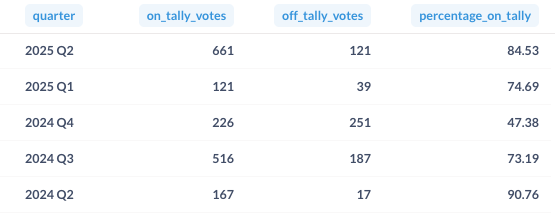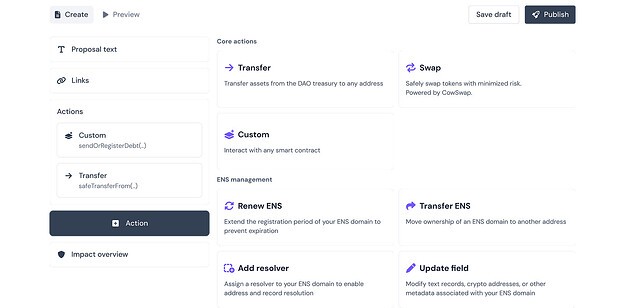Introduction & Background
Tally is the de-facto interface for ENS governance. Approximately 70% of all token-weighted votes in the DAO are cast through Tally.
We regard the ENS naming layer as foundational to cross-DAO interoperability and are committed to accelerating its next chapter, particularly for the planned migration of the protocol’s registry logic to Namechain, where Tally will deliver first-class support.
Tally proposes a formal enterprise level service agreement that elevates ENS governance UX, broadens the distribution of ENS primitives across all governance users on Tally, and furnishes the DAO with battle-tested uptime, reporting, and support guarantees.
Scope of Work
Customisable Proposal Webhooks
Proposal webhooks provide the ENS DAO with a streamlined mechanism to tailor onchain workflows, offering a range of benefits, which includes, but not limited to, timely notifications for delegates to engage in governance, improved tracking of proposals throughout their lifecycle for contributors, and alerts upon the successful onchain execution of approved proposals.
Triggerable events include:
-
Draft published (off-chain)
-
Proposal published (on-chain)
-
Quorum reached
-
24 h left to vote
-
Voting period ends
-
Proposal queued in timelock
-
Proposal executed
ENS Integration & Distribution
-
Prioritize Namechain rollout. As soon as Namechain is live on mainnet, Tally will add support for it on tally.xyz. Tally will index, decode, and display governance contracts on the network.
-
Indexing offchain ENS names. Tally will extend our resolver pipeline to ingest CCIP-Read & wildcard-enabled sub-name registries (eg *.cb.id issued by Coinbase) and Farcaster’s *.fcast.id Fnames, cryptographically verifying gateway signatures before caching in our indexer. Every user, regardless of where their ENS-compatible name is anchored, will see that name reflected on Tally profiles and proposal metadata.
-
Action to Update ENS record. Create a low-code proposal builder that lets all DAOs on Ethereum mainnet easily modify text records directly from a proposal. This includes setting resolvers and records (text, address, reverse).
Enterprise Support Levels
ENS will have access to Tally’s in-house engineers directly available to proactively resolve support issues and assist users, even in cases where the issues are not confined exclusively to the Tally platform. In addition, we will be waiving the 0.25% transfer fee on every proposal.
Support response time guarantees
-
Critical Issues (e.g., service outage, security breach): Initial response within 1 hour, updates every 2 hours until resolved.
-
High-Priority Issues (e.g., significant performance issues, partial system failure): Initial response within 4 hours, updates every 6 hours until resolved.
-
Medium-Priority Issues (e.g., UI/UX bugs, non-critical feature issues): Initial response within 1 business day, resolved within a commercially reasonable timeframe.
-
Low-Priority Issues (e.g., minor bugs, general inquiries): Initial response within 3 business days, resolved within a commercially reasonable timeframe
KPIs and Success Metrics
Ongoing Program KPIs
-
90 % + attendance at weekly MetaGov calls by at least one Tally team member
-
Maintain 99.9 % + uptime for the ENS Tally client (web + API)
-
Support 100 % of on-chain governance proposals with timely frontend updates reflecting user feedback and governance activity
-
Add full support for Namechain on mainnet launch
Quarterly KPIs
-
Deliver quarterly reports detailing features shipped to the ENS Tally client and their alignment with ENS governance priorities
-
Publish a quarterly feedback and fixes summary documenting bugs, feature requests, and actions taken by the Tally team
-
Report ENS-specific usage metrics within Tally, including delegate discovery traffic, proposal creation frequency, and number of unique ENS-based user sessions
-
Highlight integrations or UI/UX improvements that expand ENS visibility within Tally, such as showcasing ENS names in proposal authorship, delegate profiles, and voting summaries
SLAs
- Tally usage
- We will continue to track the number of proposals and % of votes per proposal made on Tally and report on those to the DAO.
- Roadmap feature usage
- As we roll out new features for the ENS DAO, we will track usage of those features and report on them to the DAO.
- Monthly office hours
- An open feedback session for ENS DAO contributors to suggest new features and contribute to our roadmap
- Uptime and availability
- System Uptime: 99.9% monthly uptime, ensuring the system is accessible with minimal disruptions.
- Scheduled Downtime: Maximum of 2% monthly allowance for scheduled maintenance, communicated in advance.
- Response and resolution time
- As per the Enterprise Support Levels section above.
- Maintenance and support
-
Bug Resolution: Resolution of non-critical bugs within 5 business days and critical bugs within 1 business day. For bugs that are not possible to resolve in this time frame, a post-mortem analysis to be shared with the DAO following resolution.
-
Regular Maintenance Updates: Regular monthly maintenance updates, including minor upgrades, patches, and performance improvements.
-
- Public API access
-
Tally provides open access to its governance API, allowing developers to query proposal data, vote records, delegate profiles, and DAO metadata. We ensure 99.9% monthly uptime for the API and will notify the DAO of any major updates, deprecations, or downtime.
-
Feature requests and support for API integrations can be raised during monthly office hours or through direct support channels.
-
Costs
| Workstream | Year 1 Cost (USD) | Recurring (Year 2 onwards) |
|---|---|---|
| Proposal lifecycle Webhooks | $28,000 | |
| ENS integration (off-chain indexing, Namechain) | $92,000 | |
| Enterprise Support Levels | $60,000 | |
| Total | $180,000 | $60,000 |
| (Enterprise Support Plan) | ||
| Payment Split | $100,000 (USD) + $80,000 in ENS tokens | $40,000 (USD) + $20,000 in ENS tokens |
Past Achievements & Useful Links
Tally has delivered proven results:
- Over $1B moved via DAO proposals on Tally
- Over 7,000 proposals created using the Tally platform
- Tally supports over 40 million token holders
Some of our ENS-specific contributions:
- Integrated Ethereum Follow Protocol
- Enabled gasless voting and delegation for ENS tokenholders on Tally
- Integrated ENS name lookup across the Explore Delegates page and governance URLs
- Supported in-app Discourse commenting for ENS proposals
- Featured ENS during Tally’s Delegation Week Spotlight
For more:
- Tally GitHub (57+ public repos)
- Tally Documentation
- Live ENS governance interface
- Tally X
- Tally’s DAO Talk Podcast
Conclusion
Formalising Tally as the ENS DAO’s dedicated governance service provider institutionalizes the tooling, reliability, and transparency already trusted by the majority of voters. More so, it unlocks new ENS-centric capabilities, particularly, seamless off-chain name resolution and Namechain readiness.
We welcome feedback from delegates and the broader community, make necessary refinements, and will progress this temperature check to a draft proposal once we have a good sense of the general sentiment.


